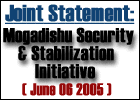|

|

SUMMARY
![]() The Djibouti conference for members of the Somali business community was held within the framework of the IGAD-sponsored Somali National Reconciliation Conference in Kenya.
The Djibouti conference for members of the Somali business community was held within the framework of the IGAD-sponsored Somali National Reconciliation Conference in Kenya.
![]() The role of the business community in the implementation of peace is critical not only because of the financial and political resources it can offer a reconstituted Somalia government, but also because its input will be vital on such contentious issues as demobilization, disarmament and reintegration of militias.
The role of the business community in the implementation of peace is critical not only because of the financial and political resources it can offer a reconstituted Somalia government, but also because its input will be vital on such contentious issues as demobilization, disarmament and reintegration of militias.
![]() Central to the conference's discussions was the need to achieve a balance between the business community's national obligations and commitment on the one hand, and the new government's willingness to respect and safeguard the private sector's ability and right to generate revenue.
Central to the conference's discussions was the need to achieve a balance between the business community's national obligations and commitment on the one hand, and the new government's willingness to respect and safeguard the private sector's ability and right to generate revenue.
![]() The president of Djibouti, in his speech, emphasized the positive contributions of the business community following state collapse in providing both services and goods to the Somali community. He also alluded to the negative dimensions and consequences of its activities during that time: "A Somali businessman is governed by self-interest to the core without having much knowledge of what that means."
The president of Djibouti, in his speech, emphasized the positive contributions of the business community following state collapse in providing both services and goods to the Somali community. He also alluded to the negative dimensions and consequences of its activities during that time: "A Somali businessman is governed by self-interest to the core without having much knowledge of what that means."
![]() Representatives of the regional and international community repeatedly stressed the centrality of the Somali business community to reconstruction and implementation of peace on the ground. Speakers reiterated that the government that emerges from Mbagathi must be recognized and supported. Members of the IGAD Inter-Ministerial committee present expressed their unified commitment to seeing Somalia set on its feet once again.
Representatives of the regional and international community repeatedly stressed the centrality of the Somali business community to reconstruction and implementation of peace on the ground. Speakers reiterated that the government that emerges from Mbagathi must be recognized and supported. Members of the IGAD Inter-Ministerial committee present expressed their unified commitment to seeing Somalia set on its feet once again.
![]() The detailed declaration of involvement and support by the EU representative, the statement by Babafemi Badejo of UNPOS and the presence of Abdisalam Omer Hadliye of UNDP Somalia conveyed powerfully the international community's resolve to assist a new administration.
The detailed declaration of involvement and support by the EU representative, the statement by Babafemi Badejo of UNPOS and the presence of Abdisalam Omer Hadliye of UNDP Somalia conveyed powerfully the international community's resolve to assist a new administration.
![]() Conference participants expressed their willingness to take a role in the reconstruction of their country and to contribute to the efforts of implementation of peace on the ground in full cooperation with the new Somali government.
Conference participants expressed their willingness to take a role in the reconstruction of their country and to contribute to the efforts of implementation of peace on the ground in full cooperation with the new Somali government.
![]() The representatives of the business community also signaled their understanding that the real challenges lie ahead: to achieve a workable national government on the ground and to assure both the Somali people and the regional community that Somalia is fully reintegrated financially and politically into the world community.
The representatives of the business community also signaled their understanding that the real challenges lie ahead: to achieve a workable national government on the ground and to assure both the Somali people and the regional community that Somalia is fully reintegrated financially and politically into the world community.
![]() There were frequent allusions, in debate and speeches, to the scope and nature of the Somali crisis. Moreover, the consequences of continuing statelessness for the private sector and the wider Somali community, in terms of freedom of movement and security were acknowledged. As the president of Djibouti succinctly put it, "The gains generated from the absence of formal taxation mean nothing in the long term."
There were frequent allusions, in debate and speeches, to the scope and nature of the Somali crisis. Moreover, the consequences of continuing statelessness for the private sector and the wider Somali community, in terms of freedom of movement and security were acknowledged. As the president of Djibouti succinctly put it, "The gains generated from the absence of formal taxation mean nothing in the long term."
Designed and hosted By The Web Technology







